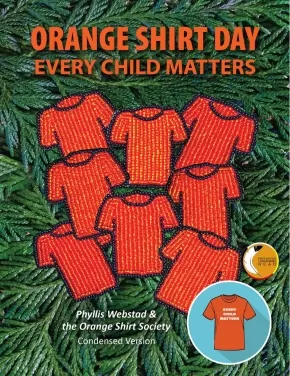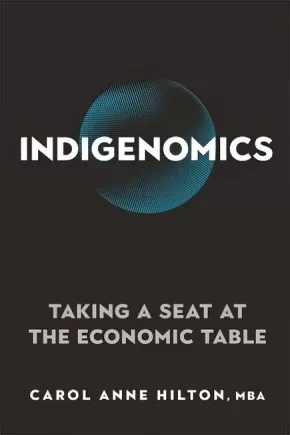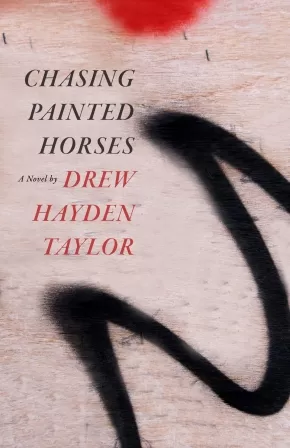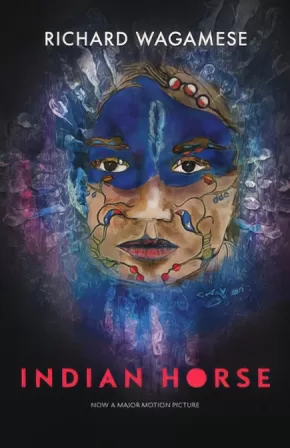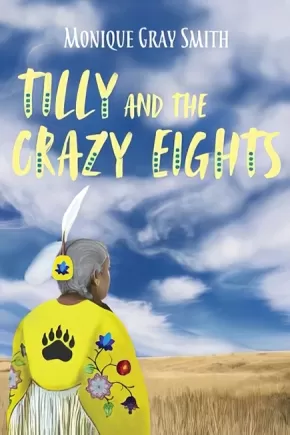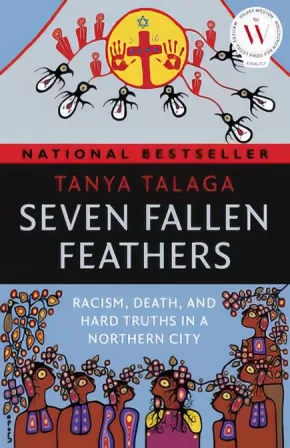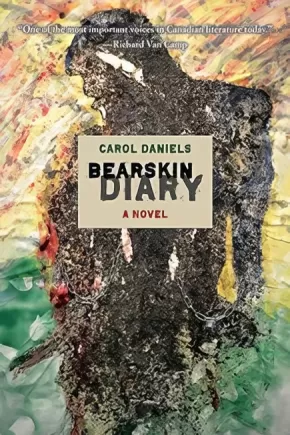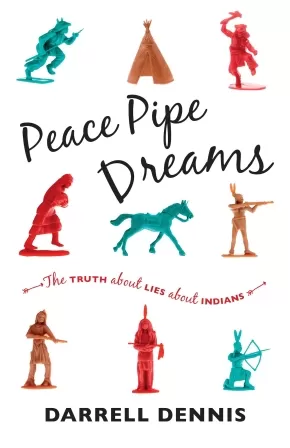
First Nation Communities Read: Indigenous Literacy Award
1
-
9
of
9 Results;
Sort By
First Nation Communities Read is an annual reading program launched in 2003 by the First Nations public library community in Ontario. First Nation Communities Read selected and other recommended titles:
- encourage family literacy, intergenerational storytelling, and intergenerational information sharing;
- are written and/or illustrated by, or otherwise involve the participation of a First Nation, Métis, or Inuit creator;
- contain First Nation, Métis, or Inuit content produced with the support of First Nation, Métis, or Inuit advisers/consultants or First Nation, Métis, or Inuit endorsement.
The winner(s) from each year can be found here. If you would like to see all the selections from each year, please visit the First Nations Communities Read category under Kids, Teens, or Adult Books.
Orange Shirt Day: Every Child Matters: Condensed Edition
$19.99
Format:
Paperback
Text Content Territories:
Indigenous Canadian; First Nations; Inuit; Métis;
ISBN / Barcode: 9781778540158
Synopsis:
Synopsis:
A special abridged version of the award-winning book Orange Shirt Day: September 30th.
Orange Shirt Day, observed annually on September 30th, is also known as the National Day for Truth and Reconciliation. It is an official day to honour Residential School Survivors and their families, and to remember the children who did not come home. What was initially envisioned as a way to keep the conversations going about all aspects of Residential Schools in Williams Lake and the Cariboo Region of British Columbia, Canada, has now expanded into a movement across Turtle Island and beyond.
Orange Shirt Day: Every Child Matters aims to create champions who will walk a path of reconciliation and promote the message that 'Every Child Matters'. This version also explores a number of important topics including the historical, generational, and continual impacts of Residential Schools on Indigenous Peoples, the journey of the Orange Shirt Day movement, and how you can effectively participate in the National Day for Truth and Reconciliation. With end-of-chapter reflection questions and a series of student art submissions, readers are guided to explore how they, and others, view and participate in Residential School reconciliation.
Educator Information
Recommended for Young Adults (ages 10+)
This is an abridged version (condensed version) of Orange Shirt Day: September 30th.
This book is available in French: La journee du chandail orange: Chaque enfant compte
Additional Information
108 pages | 8.50" x 11.00" | Paperback
Orange Shirt Day: September 30th: Revised Edition
$32.99
Format:
Hardcover
Text Content Territories:
Indigenous Canadian; First Nations; Inuit; Métis;
ISBN / Barcode: 9781778540141
Synopsis:
Synopsis:
Orange Shirt Day, observed annually on September 30th, is also known as the National Day for Truth and Reconciliation. It is an official day to honour Residential School Survivors and their families, and to remember the children who did not come home. What was initially envisioned as a way to keep the conversations going about all aspects of Residential Schools in Williams Lake and the Cariboo Region of British Columbia, Canada, has now expanded into a movement across Turtle Island and beyond. Orange Shirt Day: September 30th aims to create champions who will walk a path of reconciliation and promote the message that 'Every Child Matters'. This award-winning book explores a number of important topics including the historical, generational, and continual impacts of Residential Schools on Indigenous Peoples, the journey of the Orange Shirt Day movement, and how you can effectively participate in the National Day for Truth and Reconciliation. With end of chapter reflection questions and a series of student art submissions, readers are guided to explore how they, and others, view and participate in Residential School reconciliation.
Awards
- 2021 First Nation Communities Read 2021 Winner
Educator Information
Recommended Ages: 10+
Orange Shirt Day was inspired by the story of a survivor named Phyllis Webstad. When Phyllis was 6 years old she went to residential school for the first time wearing a brand new shiny orange shirt. When she arrived at the school her shirt was taken away and never to be seen again. To Phyllis the colour orange was a symbol that she did not matter. Today she has learned to accept the colour and even have fun with it and now the orange shirt has become a symbol of hope and reconciliation. By wearing an orange shirt on Orange Shirt Day, you make a powerful statement that residential schools were wrong and commit to the concept that EVERY CHILD MATTERS.
The Orange Shirt Society is a non-profit organization with its home in Williams Lake, BC where Orange Shirt Day began in 2013. The society has both Indigenous and non-Indigenous board members, and one of the editors of this book, Phyllis Webstad, is Indigenous. Therefore, the Authentic Indigenous Text label has been applied. It is up to readers to determine if this book is authentic for their purposes.
This is the Revised 2023, 2nd Edition
Additional Information
156 pages | 8.23" x 11.06" | Revised, 2nd Edition
Indigenomics: Taking a Seat at the Economic Table
$24.99
Format:
Paperback
Text Content Territories:
Indigenous Canadian;
Grade Levels: University/College;
ISBN / Barcode: 9780865719408
Synopsis:
Synopsis:
Igniting the $100 billion Indigenous economy
It is time. It is time to increase the visibility, role, and responsibility of the emerging modern Indigenous economy and the people involved. This is the foundation for economic reconciliation. This is Indigenomics.
Indigenomics lays out the tenets of the emerging Indigenous economy, built around relationships, multigenerational stewardship of resources, and care for all. Highlights include:
- The ongoing power shift and rise of the modern Indigenous economy
- Voices of leading Indigenous business leaders
- The unfolding story in the law courts that is testing Canada's relationship with Indigenous peoples
- Exposure of the false media narrative of Indigenous dependency
- A new narrative, rooted in the reality on the ground, that Indigenous peoples are economic powerhouses
- On the ground examples of the emerging Indigenous economy.
Indigenomics calls for a new model of development, one that advances Indigenous self-determination, collective well-being, and reconciliation. This is vital reading for business leaders and entrepreneurs, Indigenous organizations and nations, governments and policymakers, and economists.
Awards
- 2022 First Nations Community Reads Award
Educator Information
This book is centered within the United Nations Declaration on the Rights of Indigenous Peoples (UNDRIP).
Indigenomics is a new topic and a previously unpublished contribution to new economic thought.
This book is an important work in the emerging modern Indigenous economy. It is a guide to fully realizing the potential of the emerging Indigenous economy. It lays out the emerging power shift and rise of Indigenous economic empowerment. It acknowledges the unfolding story shaping Canada through the law courts that is testing the foundation of the Crown relationship with Indigenous peoples.
Includes interviews with six business leaders, all exceptional in their field.
Additional Information
272 pages | 6.00" x 9.00" | 20 b&w illustrations
Chasing Painted Horses
$32.95
Format:
Hardcover
Text Content Territories:
Indigenous Canadian;
ISBN / Barcode: 9781770865600
Synopsis:
Synopsis:
Chasing Painted Horses has a magical, fable-like quality. It is the story of four unlikely friends who live in Otter Lake, a reserve north of Toronto. Ralph and his sister, Shelley, live with their parents. On the cusp of becoming teenagers, they and their friend William befriend an odd little girl, from a dysfunctional family. Danielle, a timid 10-year-old girl, draws an amazing, arresting image of a horse that draws her loose group of friends into her fantasy world. But those friends are not ready for what that horse may mean or represent. It represents everything that’s wrong in the girl’s life and everything she wished it could be. And the trio who meet her and witness the creation of the horse, are left trying to figure out what the horse means to the girl, and later to them. And how to help the shy little girl.
Awards
- Winner of the 2020-2021 First Nation Communities Read: Indigenous Literature Award
Additional Information
6.00" x 9.00"
Indian Horse (Special Edition)
$21.95
Format:
Paperback
Text Content Territories:
Indigenous Canadian; First Nations; Anishinaabeg; Ojibway;
ISBN / Barcode: 9781771621908
Synopsis:
Synopsis:
Saul Indian Horse has hit bottom. His last binge almost killed him, and now he’s a reluctant resident in a treatment centre for alcoholics, surrounded by people he’s sure will never understand him. But Saul wants peace, and he grudgingly comes to see that he’ll find it only through telling his story. With him, readers embark on a journey back through the life he’s led as a northern Ojibway, with all its joys and sorrows.
With compassion and insight, author Richard Wagamese traces through his fictional characters the decline of a culture and a cultural way. For Saul, taken forcibly from the land and his family when he’s sent to residential school, salvation comes for a while through his incredible gifts as a hockey player. But in the harsh realities of 1960s Canada, he battles obdurate racism and the spirit-destroying effects of cultural alienation and displacement. Indian Horse unfolds against the bleak loveliness of northern Ontario, all rock, marsh, bog and cedar. Wagamese writes with a spare beauty, penetrating the heart of a remarkable Ojibway man.
Awards
- 2013 Burt Award for First Nations, Métis, and Inuit Literature
- 2013 First Nation Communities Read Award
Reviews
"Richard Wagamese is a master storyteller, who blends the throb of life with spiritual links to the land, hard work, and culture to find success, his words take you into the soul of Indian Horse, to experience his pain, his growing resentments, his depression, and his fear which has to be faced if he is to regain the joy of life. This book is meant for youth, adults, and elders, to be shared, to be lived, and to be treasured for the clear message of hope and the need to go the distance." — Wawatay News
“…The hockey chapters are compelling; they evoke Sherman Alexie’s fiction that examines contemporary life on American Indian reservations through the lens of basketball. But it is as a story of reconciliation that this novel reveals Wagamese’s masterful subtly…In a single image, Wagamese complicates in blinding ways the entire narrative; in a single page, Indian Horse deepens from an enjoyable read to a gripping critique of Canada.” — Kyle Carsten Wyatt, The Walrus, 2012
Educator Information
Grades 10-12 BC English First Peoples resource for units on Lost People, Reconciliation, and Place-Conscious Learning.
Caution: Substance Abuse, Mature Content
Additional Information
232 pages | 5.50" x 8.50"
This special edition of Richard Wagamese’s novel Indian Horse has been released to coincide with the release of the film Indian Horse in the spring of 2018.
Tilly and the Crazy Eights
$21.95
Format:
Paperback
Text Content Territories:
Indigenous Canadian; First Nations; Sioux; Lakota; Cree (Nehiyawak);
ISBN / Barcode: 9781772600759
Synopsis:
Synopsis:
An unexpected journey can be powerful medicine.
When Tilly receives an invitation to help drive eight elders on their ultimate bucket list road trip to Albuquerque, New Mexico, for the Gathering of Nations Pow Wow, she impulsively says yes. Before she knows it, Tilly has said goodbye to her family and is behind the wheel—ready to embark on an adventure that will transform her in ways she could not predict, just as it will for each and every one of the seniors on the trip, who soon dub themselves “the Crazy Eights.”
Tilly and the Crazy Eights each choose a stop to make along the way—somewhere they’ve always wanted to go or something they’ve wanted to experience. This takes them on a route to Las Vegas and Sedona, with a final goal of reaching the Redwood Forest. Each stop becomes the inspiration for secrets and stories to be revealed. The trip proves to be powerful medicine as they laugh, heal, argue, and reveal hopes and dreams along the way. With friendships forged, love found, hearts broken and mended, Tilly and the Crazy Eights feel ready for anything by the time their bus rolls to a stop in New Mexico. But are they?
Educator Information
This is a fictional novel for adults from the author of the groundbreaking children's books Speaking Our Truth: A Journey of Reconciliation and My Heart Fills with Happiness.
Reviews
"Tilly and the Crazy Eights, [is] a sequel of sorts to Smith’s first book [Tilly: A Story of Hope and Resilience].... In Smith’s first novel, Tilly was coming of age and into sobriety; now the reader finds her at mid-life, a married mother of two who’s at a crossroads. The opportunity to spend two weeks with Elders and receive the gifts of their teachings is the medicine she needs. Ideas of medicine recur throughout the text – laughter is medicine, and so are tears and words. For everyone, this will be a journey about healing..... Most powerfully, Smith infuses her novel with joy, love, and laughter and suggests that these could be what determine the future after all."— Quill & Quire, September 2018
Educator Information
The Canadian Indigenous Books for Schools list recommends this resource for Grades 10-12 English Language Arts.
Additional Information
230 pages | 5.50" x 8.50"
Seven Fallen Feathers: Racism, Death, and Hard Truths in a Northern City
$22.99
Format:
Paperback
Text Content Territories:
Indigenous Canadian; First Nations; Anishinaabeg; Ojibway;
ISBN / Barcode: 9781487002268
Synopsis:
Synopsis:
In 1966, twelve-year-old Chanie Wenjack froze to death on the railway tracks after running away from residential school. An inquest was called and four recommendations were made to prevent another tragedy. None of those recommendations were applied.
More than a quarter of a century later, from 2000 to 2011, seven Indigenous high school students died in Thunder Bay, Ontario. The seven were hundreds of miles away from their families, forced to leave home and live in a foreign and unwelcoming city. Five were found dead in the rivers surrounding Lake Superior, below a sacred Indigenous site. Jordan Wabasse, a gentle boy and star hockey player, disappeared into the minus twenty degrees Celsius night. The body of celebrated artist Norval Morrisseau’s grandson, Kyle, was pulled from a river, as was Curran Strang’s. Robyn Harper died in her boarding-house hallway and Paul Panacheese inexplicably collapsed on his kitchen floor. Reggie Bushie’s death finally prompted an inquest, seven years after the discovery of Jethro Anderson, the first boy whose body was found in the water.
Using a sweeping narrative focusing on the lives of the students, award-winning investigative journalist Tanya Talaga delves into the history of this small northern city that has come to manifest Canada’s long struggle with human rights violations against Indigenous communities.
A portion of each sale of Seven Fallen Feathers will go to the Dennis Franklin Cromarty Memorial Fund, set up in 1994 to financially assist Nishnawbe Aski Nation students’ studies in Thunder Bay and at post-secondary institutions.
Awards
- 2018-2019 First Nation Communities Read
- 2018 RBC Taylor Prize
Reviews
“Talaga has written Canada’s J’Accuse, an open letter to the rest of us about the many ways we contribute — through act or inaction — to suicides and damaged existences in Canada’s Indigenous communities. Tanya Talaga’s account of teen lives and deaths in and near Thunder Bay is detailed, balanced and heart-rending. Talaga describes gaps in the system large enough for beloved children and adults to fall through, endemic indifference, casual racism and a persistent lack of resources. It is impossible to read this book and come away unchanged.” — RBC Taylor Prize Jury Citation
“In Seven Fallen Feathers, Tanya Talaga delves into the lives of seven Indigenous students who died while attending high school in Thunder Bay over the first eleven years of this century. With a narrative voice encompassing lyrical creation myth, razor-sharp reporting, and a searing critique of Canada’s ongoing colonial legacy, Talaga binds these tragedies — and the ambivalent response from police and government — into a compelling tapestry. This vivid, wrenching book shatters the air of abstraction that so often permeates news of the injustices Indigenous communities face every day. It is impossible to read Seven Fallen Feathers and not care about the lives lost, the families thrust into purgatory, while the rest of society looks away.” — Hilary Weston Writers’ Trust Prize for Nonfiction Jury Citation
“[A]n urgent and unshakable portrait of the horrors faced by Indigenous teens going to school in Thunder Bay, Ontario, far from their homes and families. . . . Talaga’s incisive research and breathtaking storytelling could bring this community one step closer to the healing it deserves.” — Booklist, STARRED REVIEW
“Seven Fallen Feathers may prove to be the most important book published in Canada in 2017. Tanya Talaga offers well-researched, difficult truths that expose the systemic racism, poverty, and powerlessness that contribute to the ongoing issues facing Indigenous youth, their families, and their communities. It is a call to action that deeply honours the lives of the seven young people; our entire nation should feel their loss profoundly.” — Patti LaBoucane-Benson, author of The Outside Circle
“[W]here Seven Fallen Feathers truly shines is in Talaga’s intimate retellings of what families experience when a loved one goes missing, from filing a missing-persons report with police, to the long and brutal investigation process, to the final visit in the coroner’s office. It’s a heartbreaking portrait of an indifferent and often callous system . . . Seven Fallen Feathers is a must-read for all Canadians. It shows us where we came from, where we’re at, and what we need to do to make the country a better place for us all.” — The Walrus
Educator Information
The Canadian Indigenous Books for Schools list recommends this resource for Grade 12 English Language Arts and Social Studies.
Curriculum Connections: Indigenous Studies, History, Health
Additional Information
376 pages | 5.50" x 8.50" | 8-page colour insert and maps
Bearskin Diary
$21.95
Format:
Paperback
Text Content Territories:
Indigenous Canadian; First Nations;
ISBN / Barcode: 9780889713116
Synopsis:
Synopsis:
In 2017-2018, Bearskin Diary was the award recipient for First Nation Communities Read.
Raw and honest, Bearskin Diary gives voice to a generation of First Nations women who have always been silenced, at a time when movements like Idle No More call for a national inquiry into the missing and murdered Aboriginal women. Carol Daniels adds an important perspective to the Canadian literary landscape.
Taken from the arms of her mother as soon as she was born, Sandy was only one of over twenty thousand Aboriginal children scooped up by the federal government between the 1960s and 1980s. Sandy was adopted by a Ukrainian family and grew up as the only First Nations child in a town of white people. Ostracized by everyone around her and tired of being different, at the early age of five she tried to scrub the brown off her skin. But she was never sent back into the foster system, and for that she considers herself lucky.
From this tragic period in her personal life and in Canadian history, Sandy does not emerge unscathed, but she emerges strong--finding her way by embracing the First Nations culture that the Sixties Scoop had tried to deny. Those very roots allow Sandy to overcome the discriminations that she suffers every day from her co-workers, from strangers and sometimes even from herself.
Additional Information
|
Peace Pipe Dreams
$22.95
Format:
Paperback
Text Content Territories:
Indigenous Canadian; Métis; Inuit; First Nations;
ISBN / Barcode: 9781771000406
Synopsis:
Synopsis:
In 2015-2016, Peace Pipe Dreams was the award recipient for First Nation Communities Read.
Darrell Dennis is a stereotype-busting, politically incorrect Native American/Aboriginal/Shuswap (Only he's allowed to call himself an "Indian." Maybe. Under some circumstances). With a large dose of humour and irreverence, he untangles some of the truths and myths about First Nations: Why do people think Natives get free trucks, and why didn't he ever get one? Why does the length of your hair determine whether you’re good or bad? By what ratio does the amount of rain in a year depend on the amount of cactus liquor you consume?
In addition to answering these burning questions, Dennis tackles some tougher subjects. He looks at European-Native interactions in North America from the moment of first contact, discussing the fur trade, treaty-signing and the implementation of residential schools. Addressing misconceptions still widely believed today, Dennis explains why Native people aren't genetically any more predisposed to become alcoholics than Caucasians; that Native religion doesn't consist of worshipping rocks, disappearing into thin air, or conversing with animals; and that tax exemptions are so limited and confusing that many people don't even bother.
Employing pop culture examples, personal anecdote and a cutting wit, Darrell Dennis deftly weaves history with current events to entertain, inform and provide a convincing, readable overview of First Nations issues and why they matter today.
Additional Information
224 pages | 5.65" x 8.52"
Sort By

